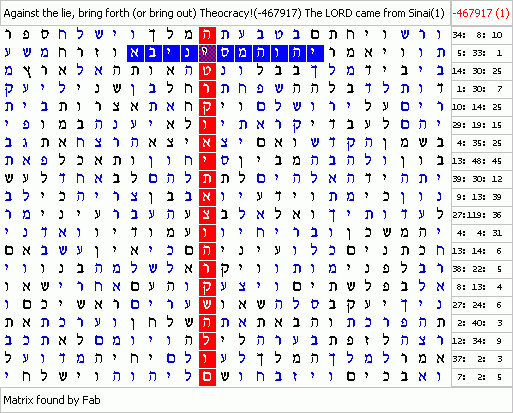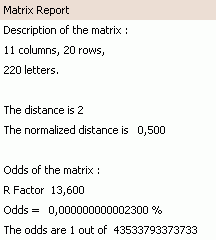
Code by Fab (6/Sept/2009)
Against the lie; bring forth theocracy!



I searched for the term "Theocracy" in a wrapped Tanakh. 3 occurrences were expected statistically, and 3 were found. The second minimal skip could be extended to "against the lie, bring forth/bring out Theocracy!". I noticed it goes through Deuteronomy 33:2:
"And he said: The LORD came from Sinai, and rose from Seir unto them; He shined forth from mount Paran, and He came from the myriads holy, at His right hand was a fiery law unto them."
Which quite interesting, since the Nave's Topical Bible Dictionary provides the following Biblical references for Theocracy:
http://www.biblestudytools.com/Concordances/NavesTopicalBible/ntb.cgi
Theocracy [E]
Established - Exodus 19:8; 24:3,7; Deuteronomy 5:25-29; 33:2-5; Judges 8:23; 1 Samuel 12:12
Rejected by Israel - 1 Samuel 8:7,19; 10:19; 2 Chronicles 13:8
http://en.wikipedia.org/wiki/Theocracy
The word theocracy originates from the Greek, meaning "the rule of God". This in turn derives from the Greek words theós (from an Indo-European root occurring in religious concepts) meaning “god,” and krátein, meaning “to rule.” Thus the meaning of the word in Greek was “rule by god(s)” or human incarnation(s) of god(s).
It was first coined by Josephus Flavius in the first century A.D. to describe the characteristic government for Jews. Josephus argued that while the Greeks recognized three types of government: monarchy, aristocracy, and anarchy, the Jews were unique in that they had a system of government that did not fit into those categories. Josephus understood theocracy as a fourth form of government in which only God and his law is sovereign. Josephus' definition was widely accepted until the Enlightenment era, when the term started to collect more universalistic and undeniably negative connotations, especially in Hegel's hands.